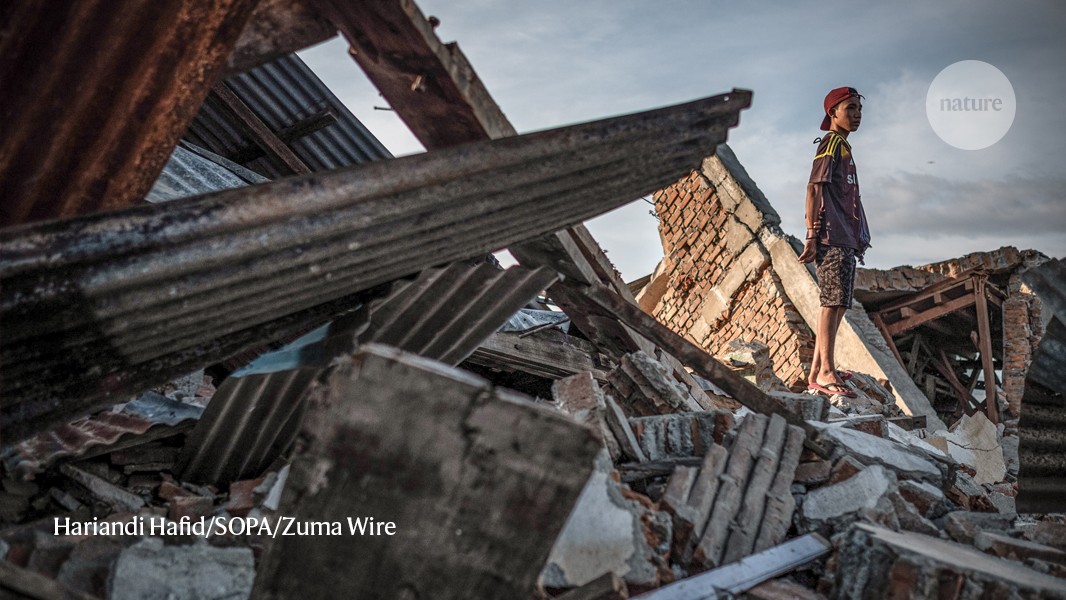Play all audios:
COMMENT 20 November 2019 Disaster-zone research needs a code of conduct Study the effects of earthquakes, floods and other natural hazards with sensitivity to ethical dilemmas and power
imbalances. By JC Gaillard0 & Lori Peek1 JC Gaillard JC Gaillard is an associate professor in the School of Environment at the University of Auckland, New Zealand; and extraordinary
professor in the Unit for Environmental Sciences and Management, North-West University, Potchefstroom, South Africa.
View author publications You can also search for this author in PubMed Google Scholar
Lori Peek Lori Peek is professor of sociology and director of the Natural Hazards Center, University of Colorado Boulder, USA; and principal investigator of the US National Science
Foundation-supported CONVERGE, SSEER and ISEEER Initiatives.
View author publications You can also search for this author in PubMed Google Scholar
Twitter Facebook Email A collapsed building in the city of Palu in Sulawesi, Indonesia, after a magnitude-7.5 earthquake hit the region in September 2018. Credit: Hariandi Hafid/SOPA/Zuma
Wire
Access through your institution Buy or subscribe A magnitude-7.0 earthquake rocked Anchorage, Alaska, in late November 2018. Roads buckled and chimneys tumbled from rooftops. Business
operations were disrupted. Schools were damaged across the district. This was the largest earthquake to shake the region in a generation, and there was much to learn. What was the state of
the infrastructure? Might further quakes occur? How did people respond? Teams of scientists and engineers from across the United States mobilized to conduct field reconnaissance in
partnership with local researchers and practitioners. These efforts were coordinated through the clearing house set up by the Earthquake Engineering Research Institute in Oakland,
California, which provided daily in-person and online briefings, as well as a web portal for sharing data.
Access options Access through your institution Additional access options: Login Learn about institutional subscriptions Read our FAQs Contact customer support
Nature 575, 440-442 (2019)
doi: https://doi.org/10.1038/d41586-019-03534-z
References Missbach, A. Crit. Asian Stud. 43, 373–398 (2011).
Article Google Scholar
Nature 562, 317–318 (2018).
Article PubMed Google Scholar
Kendra, J. & Gregory, S. in Disaster Research and the Second Environmental Crisis (eds Kendra, J., Knowles, S. G. & Wachtendorf, T.) 319–341 (Springer, 2019).
Google Scholar
Beaven, S., Wilson, T., Johnston, L., Johnston, D. & Smith, R. Earthq. Spectra 32, 713–735 (2016).
Article Google Scholar
Guillemin, M. & Gillam, L. Qual. Inq. 10, 261–280 (2004).
Article Google Scholar
Browne, K. E. & Peek, L. Int. J. Mass Emerg. Disasters 32, 82–120 (2014); http://ijmed.org/articles/651/
Google Scholar
Chambers, R. Rural Development: Putting the Last First (Longman, 1983).
Google Scholar
Gaillard, J. C. Disasters 43, S7–S17 (2019).
Article PubMed Google Scholar
Gaillard, J. C. & Gomez, C. Jàmbá: J. Disaster Risk Stud. https://doi.org/10.4102/jamba.v7i1.120 (2015).
Article Google Scholar
Barber, K. & Haney, T. J. Sociol. Spectrum 36, 57–74 (2016).
Article Google Scholar
Houston, J. B. et al. PLoS Curr. https://www.ncbi.nlm.nih.gov/pmc/articles/PMC4639320 (2015).
Browne, K. Standing in the Need (Univ. Texas Press, 2015).
Google Scholar
Bankoff, G. Disasters 25, 19–35 (2001).
Article PubMed Google Scholar
Miller, A. et al. Int. J. Environ. Res. Public Health 13, 676 (2016).
Article Google Scholar
Sumathipala, A. et al. Asian Bioeth. Rev. 2, 124–142 (2007).
Google Scholar
Collogan, L. K., Tuma, F., Dolan-Sewell, R., Borja, S. & Fleischman, A. R. J. Trauma. Stress 17, 363–372 (2004).
Article PubMed Google Scholar
Download references
Reprints and permissions
Related Articles Developing world: Discuss inequality
Mental health: Tailor informed-consent processes
Build the Ebola database in Africa
Subjects Environmental sciences Ethics Research management Society Latest on: Environmental sciences A message from island leaders: protect the Pacific Ocean from deep-sea mining
Comment 05 JUN 25
Ancient carbon released through modern rivers
News & Views 04 JUN 25
Underwater kelp forests are losing a turf war
News & Views 30 MAY 25
Ethics Brain-reading devices raise ethical dilemmas — researchers propose protections
News 03 JUN 25
Nations urged to ‘pick up the ball’ after DEI research cuts
Nature Index 22 MAY 25
Why space exploration must not be left to a few powerful nations
Comment 22 MAY 25
Research management How I got through the loss of my supervisors
Career Column 05 JUN 25
‘A funeral for our careers’: Trump’s science cuts spill onto Canadian turf
Career Feature 28 MAY 25
Europe can capture the US brain drain — if it acts fast
World View 28 MAY 25
Jobs Gathering the Talents and Writing Our Glorious Chapter Wuxi Medical College of Jiangnan University (Affiliated Hospital) invites you to join us!
Wuxi, Jiangsu (CN)
Wuxi Medical College of Jiangnan University (Affiliated Hospital)
Professorship for Trauma, Hand and Reconstructive Surgery (W3) The Jena University Hospital (JUH) invites applications for a Professorship for Trauma, Hand and Reconstructive Surgery (W3)
to be filled at th...
Jena, Thüringen (DE)
Friedrich-Schiller-Universität Jena
Group Leader - Molecular Mechanisms of Environmental Adaptation EMBL is seeking a Group Leader to develop an independent research program on molecular mechanisms driving phenotype and
environmental response.
Rome (IT)
European Molecular Biology Laboratory (EMBL)
Faculty and Research Positions, Postdoctoral Recruitment Jointly sponsored by the Hangzhou Municipal People's Government and the University of Chinese Academy of Sciences.
Hangzhou, Zhejiang, China
Hangzhou Institute of Advanced Study, UCAS
Tenure-Track Assistant Professor at the Graduate School of Pharmaceutical Studies, Tohoku University The Graduate School of Pharmaceutical Studies at Tohoku Universities invites applications
for one open tenure-track assistant professor position.
Japan (JP)
Tohoku University

